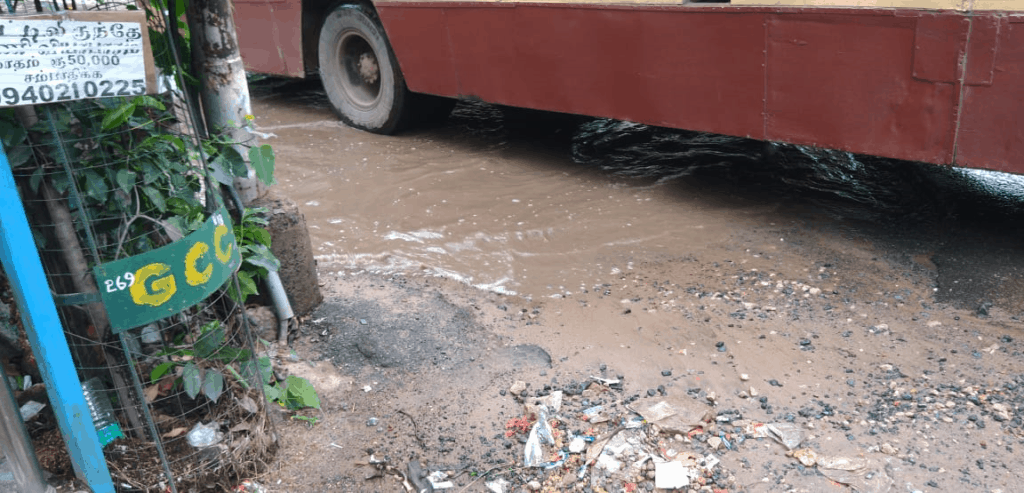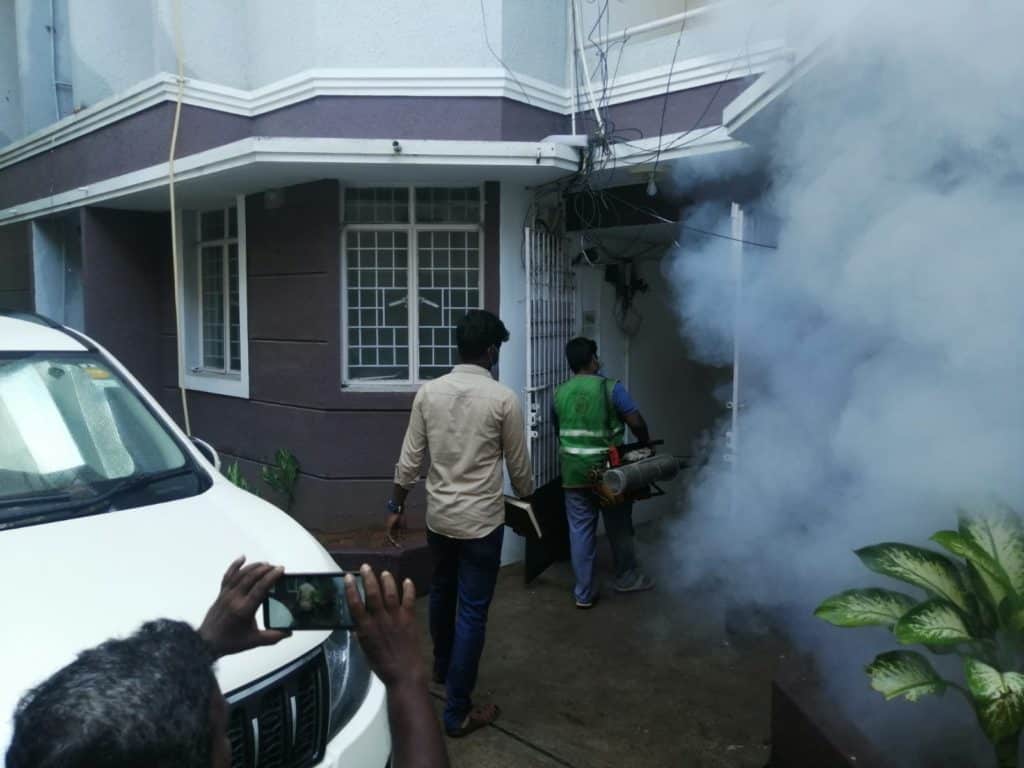According to data from the Directorate General of Health Services, Ministry of Health and Family Welfare (MoHFW), Government of India, Tamil Nadu recorded a total of 2,185 dengue cases during the year 2021 (as of July). To add to that, data obtained from the health department of the Greater Chennai Corporation (GCC) shows that Chennai alone recorded 100 dengue cases in August and 129 cases in September, which means that the total number of dengue cases in the state has already surpassed that of the previous year, which stood at 2,410 (MoHFW).
This however, is not unusual as dengue has become an almost inevitable phenomenon following rains in the state. It should also be noted that Tamil Nadu has been witness to much higher numbers of dengue cases during the years before 2020. But there is an increased concern this year regarding these seasonal vector borne diseases, given that citizens, administrations and the health machinery are already in the throes of an ongoing pandemic.
As we spoke to various residents in Chennai, health officials and Corporation officers to find out how citizens and local bodies are dealing with and preparing to tackle the menace of mosquito breeding and reduce the spread of dengue this year, it also became increasingly clear that it is as much a civic issue as a health-related one.
Read more: How can Chennai keep dengue at bay in the rainy season?
Of dengue and drains in the city
A common complaint raised by most of the residents that we spoke to was the lack of proper underground drainage facilities in their respective localities or poor maintenance of the same, if at all it existed. Citing the examples of areas like Madipakkam and Ullagaram, Ramarao, a social worker and a resident of Nanganallur in Chennai says that although these areas have been a part of GCC since 2011, they still do not have a proper drainage system.
“Areas like Madippakam and Ullagaram, with their high population density and lack of proper drainage systems, are where chances of dengue spread are more. Residents living in these areas are forced to let out the waste from their homes into the storm water drains, which in turn get clogged, preventing water from the roads being drained out through these,” says Ramarao. The resulting water stagnation on the roads creates breeding grounds for mosquitoes which spread the infection.
A similar complaint was also raised by Dhayanand Krishnan, a resident of Chitlapakkam and a member of the NGO Chitlapakkam Rising. Krishnan says that the issue in his locality is that some of the storm water drains are one feet higher than the existing road levels and the water cannot properly seep into these drains. “As a result, even during light rains, there is water clogging. This is where the mosquito menace starts,” he states.

Asked if they have raised a complaint with the authorities, Krishnan says that they had raised the issue with their local body, the Chitlapakkam town panchayat, but every time a complaint is raised, they send the panchayat staff and just manually push the water away from the roads, which according to him is not the solution. “They should have a proper gradient, which ensures that the excess water from the roads automatically enters the drains. This can work effectively only when the drains are constructed at the right level and there are no clogs in them.” (Incidentally, the Chitlapakkam Town Panchayat has recently been subsumed into the newly created Tambaram Corporation; however no zonal officers have been posted there yet and civic issues are still being handled by the Panchayat administration.)
Read more: Tambaram has a new Corporation, but not all residents are happy
Thamizh Chelvi, a resident of Adambakkam, says that although Corporation health workers have been involved in various anti-mosquito activities like fogging, there is still a lot of work to be done as far as preventing the spread of dengue is concerned. Thamizh lives in a locality situated near the booking counter of the St Thomas Mount railway station and she says that the area has become a dumping yard of sorts for all commuters and passers by.
“The jurisdiction over this area is also complicated, since parts of it are under the GCC and some of it is with the Railways. But as citizens, we are the ones who finally have to bear the brunt of the mosquito menace, as a result of the accumulated garbage near the railway station. Now, with the pandemic, we are all even more anxious,” she adds.
What the Chennai Corporation is doing
Dr Manish Narnaware IAS, Deputy Commissioner (Health), told us that the GCC has deployed over 3,200 workers across the 15 zones and 200 wards to go door-to-door to identify and remove stagnation of water in and around properties, which facilitates the breeding of the dengue-carrier Aedes Aegypti mosquitoes. One person visits around 80 houses a day.
Dr M Jagadeesan, City Health Officer states that last year, due to the outbreak of the pandemic, corporation staff were not allowed to enter residential houses. “But this year, they are allowed to go inside homes as well and remove any source of accumulated water that could enable mosquito breeding, for example from the back of some refrigerators where the water collects,” he says. The same is being done in commercial establishments as well.
Ramarao acknowledges the fact that the Corporation health workers are in fact engaged in the above-mentioned activities, but he feels that it is not sufficient as it is not practical for the GCC to verify and control such conditions in each and every area, given the vastness of the Corporation limits. He says that even in his locality, Corporation workers do not enter many spaces such as dilapidated buildings, vacant plots, plots for sale and other properties belonging to private individuals if the owners are not in town.
“These areas have not been maintained for years and are covered with dried leaves and plants; water often accumulates in such spots, becoming a breeding ground for mosquitoes. Corporation officials do not clean these areas,” he adds.
Meanwhile, the GCC has informed that it will impose a fine on malls, apartments and other establishments if found with stagnant water, which allows breeding of mosquitoes. For all residential properties found to have stagnant water, owners will be served with a notice as a first warning, a fine of Rs 100 as second warning and Rs 500 as third warning. Apartment complexes will be fined Rs 500 as first warning, Rs 5,000 for the second and Rs 15,000 for third violation. Other business establishments and government buildings will be fined Rs Rs 10,000 for the first violation, Rs 25,000 for the second and Rs 1,00,000 for the third violation.
The Deputy Health Commissioner also adds that the Corporation is intensifying fogging across various zones in the city. “We have around 55 vehicle-mounted fogging machines and more than 200 hand fogging machines, which we use on a daily basis. We have also started to use drones to spray anti-larval chemicals to remove mosquito breeding in sewage-mixed waterways.”

However, some citizens feel that fogging is not an effective solution to tackle the menace of mosquitoes. Fogging, they say, only makes the mosquitoes go away temporarily and they just reappear once the effects of the repellent chemicals weaken.
Tackling a twin crisis
Does the COVID-19 pandemic create a special challenge on the dengue treatment front?
Dr P Paranthaman, Head of Department of Medicine, Government Kilpauk Medical College feels that the situation at present is not as bad as had been feared, since the COVID-19 positive cases are comparatively mild at the moment, presumably due to the vaccination effect. “We do get COVID cases regularly but those are mostly with mild symptoms. And now that we’ve been treating COVID for the last one and half years, we’re also accustomed to the treatment protocol, so that’s not much of an issue.”
The challenge however, according to Dr Paranthaman, is when patients present themselves with some co-infection. So what is co-infection? In simple terms, co-infection is when an individual is affected by two or more viruses simultaneously. In the current context, the most likely threat of co-infection lies in individuals testing positive for both COVID-19 and Dengue.
Clinical features and guidelines for co-infection
Both COVID-19 and dengue have several common symptoms such as fever, fatigue, muscle pain, headache, nausea and so on. Symptoms related to disorders of the respiratory system are more pronounced in patients with COVID, and bleeding in patients with dengue. Differentiating the infections when both are present can be challenging.
Here are some clinical measures to be followed in such cases, according to MoHFW:
- Any suspicion of co-infection should be cleared with proper diagnostic methods at the early stage itself.
- Strengthening health care at the primary level to mitigate dengue through clinical diagnosis and recognition of early signs of the severity of the condition.
- Mild to moderate dengue and COVID co-infected patients should be monitored closely at the hospital, as there are chances of these symptoms progressing to a more severe stage.
- All secondary and tertiary level hospitals should be prepared to manage severe dengue and COVID cases.
Dr Paranthaman says that whenever a patient comes in with a fever, the hospital calls for a fever profile — which is a series of tests including a Complete Blood Count (CBC) and other tests to identify the root cause of the fever. “Sometimes the result comes positive for more than one infection, in which case we take measures to treat all of them,” he says. The doctor adds that clinical expertise and timely diagnosis with proper investigative knowledge is the key to tackle co-infections.
“Co-infection of dengue and COVID can be dangerous because on one hand, the blood platelet count of the patient can come down, causing bleeding risks and on the other hand, lungs can be inflamed with severe breathlessness as a result of COVID-19. What we do is, we clinically examine and find out which infection is more severe and more priority is given to treating that while managing the other,” says the doctor.
Dr Ramesh, Resident Medical Officer (RMO), Stanley Medical College says that any patient who comes in with a fever is now tested for both dengue and COVID. “We are also trying to ensure that all patients admitted to the hospital for high fever are being monitored regularly and that their platelet count is being checked both in the morning and in the evening,” he adds.
I agree with Ramarao, social worker, Nanganallur. But at the same time, I feel that GCC should think twice before imposing fines. Everyone knows water stagnates due to improper maintenance of roads, which may also be dug up by various public and private utilities, etc. Only a couple of years ago, it dawned on the authorities to dig recharge wells at major roads. A lot remains to be done – harvesting water from all flyovers, road and street corners, govt. buildings, etc. They should realize that the govt. is responsible for all these works and people cannot be taxed further for this. They already pay Property Tax, Profession Tax, Urban Land Tax, Water Tax and Charges, etc to the GCC. Lastly, construction of pavements in streets and some roads in the name of beautification has not served any major purpose, except stagnation. Another point is all their efforts will go waste if proper action against roadside eateries are not taken.They compete with builders and senseless general public in contributing to the accumulation of solid waste in our
roads.